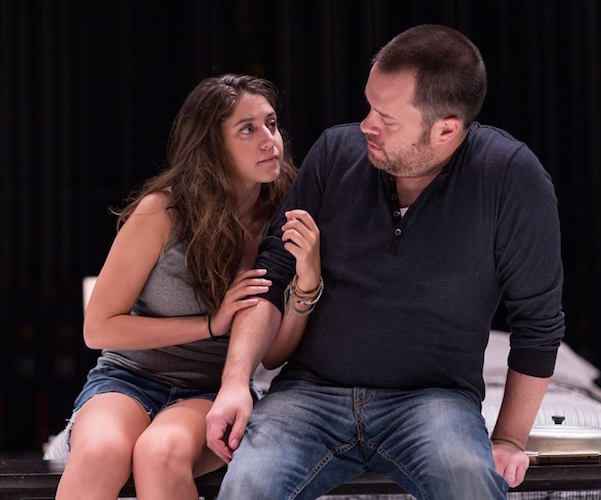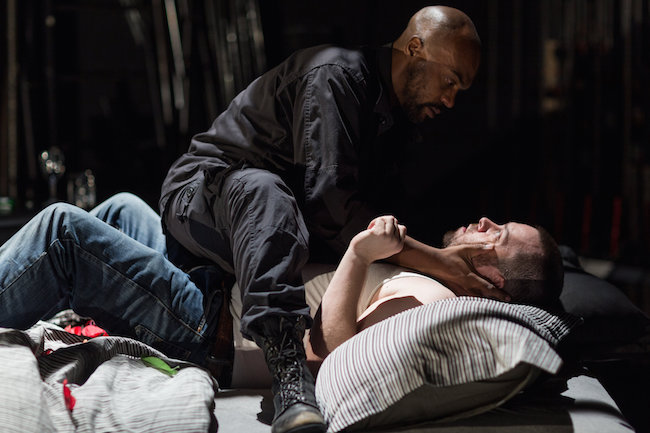Theater Review: “Blasted” — A Splendidly Visceral Wake-up Call
There is little doubt in my mind that this powerful production of Blasted will be one of the high points in Boston theater this year.
Blasted by Sarah Kane. Directed by John Kuntz. Staged by Off the Grid Theatre Company at the Calderwood Pavilion at the Boston Center for the Arts, 527 Tremont Street, Boston, MA, though September 18.

Alexis Scheer and Christopher James Webb in the Off the Grid Theatre Company production of “Blasted.” Photo: Nile Scott Shots/Nile Hawver.
By Bill Marx
Lately, I have been concerned for the survival of transgressive drama, examples of which has been frighteningly scarce at Boston’s theater companies. Controversy has traditionally been considered good for the stage. Critic John Peter wisely observed that the “theater is only alive if it is kicking.” Yet, in the post Angels in America era, most of our stage troupes seem to be too exhausted or cautious to boot at anything but the usual suspects, content to ladle out entertainment, circuses, and nostalgia. Let TV, films, documentaries, music, and dance reflect — to the point of tastelessness — the traumatic political and spiritual shocks of our times. The theater is there to make it all better, to reassure, to sing or dance or massage our anxieties away. And that is not healthy for the future of the theater. Addictive forms of ‘creative’ relaxation are coming down the pike — from increasingly sophisticated videos games to virtual reality visors – that provide escapism much more dependably and cheaply. And you don’t have to leave your home.
So — why the self-throttling timidity? There are a variety of reasons: lucrative enthusiasm for the Broadway musical, the well-earned popularity of high quality Cable TV dramas series, the rejection of Modernism, uncertainty in the face of rapidly changing technology and demographics, fear of raising the hackles of well-to-do supporters and civic poobahs, reluctance to take a chance on non-musical scripts that move in unconventional directions. We seem to be in a depressingly conservative holding pattern, stuck in the kind of artistic paralysis that transgressive theater is made to kick aside. Unfortunately, instead of nervy productions we are given branding/marketing campaigns (‘bold’ ‘adventurous’) that shamelessly hawk the idea that putting lipstick on a pig is an act of rebellion. And our compliant critics are all too willing to reinforce the illusion rather than demand the reality.
What do I mean by transgressive theater? What are we missing? We have a prime example of it with Off the Grid Theatre Company’s superb production of Sarah Kane’s Blasted, which generated a firestorm, among critics and audiences, when it premiered at the Royal Court Theatre in 1995. The plot is simple enough: a middle-aged hack journalist and a young woman enter a posh hotel room in Leeds. Ian says he loves Cate and demands sex. She demurs. He coughs as if he has lung cancer, waves a gun about, vilely insults minorities, insists on making love, and barks out self-hatred for himself and his job; she sucks her thumb, has epileptic fits, and pleads that their relationship is over. Suddenly, there’s an explosion and the hotel room is transferred to a war zone, somewhere. A heavily armed solider enters a room now filled with debris. What follows — as well as what went on before — amounts to post-modern Grand Guignol. Simulated sex acts, nudity, cannibalism, graphic descriptions of torture and murder, etc. Many critics at Blasted‘s premiere were scandalized, though not all the reviewers were negative, and a number of playwrights came to Kane’s defense, including Harold Pinter and Edward Bond. (Kane said that her script was influenced by Bond’s notorious Saved.) [A note about Bond: he is among the greatest living playwrights in English and is still writing at the age of 82. It is a disgrace that his scripts are rarely produced in New England.]
Bond’s great subject is violence, and that is very much the key to understanding the herky-jerky form and head-spinning political resonances of Blasted. Kane clarified some of the reasons behind the play’s structure to Aleks Sierz in his invaluable 2001 study of transgressive British drama of the ’90s, In-Yer-Face Theatre:
I asked myself: ‘What could possibly be the connection between a common rape in a Leeds hotel room and what is happening in Bosnia?’ And suddenly this penny dropped and I thought: “Of course, it’s obvious. One is the seed and the other is the tree.’ And I do think that the seeds of full-scale war can be found in peacetime civilization and I think the wall between so-called civilization and what happened in central Europe is very, very thin and it can get torn down at any time.
Blasted tears down that wall in a way that remains heart-stopping and agonizing. The script may not be as shocking as it was in the ’90s, but that is partly because we have caught up with its visceral jolts via long-form (and gritty) Cable TV dramas. And, more disturbingly, the barriers between us and pictures of savagery around the world have been erased over the past two decades — images of hell are now only a click away. Unfiltered video footage of unspeakable acts of slaughter and sexual degradation are commonplace on YouTube and Facebook, to the point that purported exposes quickly degenerate into voyeurism.

Maurice Emmanuel Parent and Christopher James Webb in the Off the Grid Theatre Company production of “Blasted.” Photo: Nile Scott Shots/Nile Hawver.
Director John Kuntz treats Blasted‘s chaos with an adroit, almost clinical elegance, wisely keeping a cool distance from the simmering heat of its disturbing images and acts of violence. He is alert to the script’s dark humor, its layering of humanity and absurdity. The emphasis is on theatrical imagination rather than audio-visual pizazz. That same intelligence is reflected in David Reiffel’s terrific sound design, with its peek-a-boo juxtaposition of Vivaldi and scratches. Ryan Bates’ set design is also smart — particularly memorable are the buckets suspended over the stage, waving like ringing bells after they spill down mounds of red and black debris. The performances are strong, nuanced, and unafraid — Alexis Scheer brings a childlike playfulness, an impish sexiness, to Cate, Christopher James Webb’s Ian is plainly a very ugly lost soul, vulnerable yet creepy, his bullying male dominance — wholly dependent on his gun — quickly flips to submission. Maurice Emmanuel Parent as the invading Soldier manages to be frightening, ferocious, and yet, in a strange way, tender. There is little doubt in my mind that this production will be one of the high points in Boston theater this year.
One final point about the nature of transgressive theater. Stepping outside the boundaries of conventional theater doesn’t inevitably mean embracing amorality or nihilism. I would be more than willing to defend Samuel Beckett and Louis-Ferdinand Céline from those charges. But there is a species of opportunistic political drama that masks degradation via the trappings of the transgressive. Teatrocinema’s Historia de Amor, which was presented at Arts Emerson last April, was a misogynistic drama about rape (supposedly at the service of condemning an authoritarian government) told entirely from the point of view of the male perpetrator — his female victim was never given a voice. No matter how crazed, disgusting, and homicidal Blasted‘s characters may be, they are given a voice, a compelling means of expression.
“Once you have perceived that life is very cruel,” observed Kane, “the only response is to live with as much humanity, humor and freedom as you can.” Of course, as the Greeks, Shakespeare, Brecht, Barker, Pinter, and Bond know so well, it is the stage’s responsibility to present — full blast — the horrors without and within. Thanks to Off the Grid Theatre Company’s powerful staging of Blasted, we are given a valuable reminder that serious theater reserves the right to use any means necessary to wake us up.
Bill Marx is the editor-in-chief of The Arts Fuse. For over three decades, he has written about arts and culture for print, broadcast, and online. He has regularly reviewed theater for National Public Radio Station WBUR and The Boston Globe. He created and edited WBUR Online Arts, a cultural webzine that in 2004 won an Online Journalism Award for Specialty Journalism. In 2007 he created The Arts Fuse, an online magazine dedicated to covering arts and culture in Boston and throughout New England.
Tagged: Alexis Scheer, Blasted, Christopher James Webb, John Kuntz, Off the Grid Theatre Company

Thanks so much for your review of Blasted by the Off the Grid company. I had recalled the uproar about the play when it premiered, and was surprised to see that it was being performing in Portland a few weekends back so I went to see it. I love theater history and while I love the classics especially, I also love the sort of agit-prop kinds of theater that Blasted is related to. As I was prepping to teach another semester of theater history here at the University of Maine at Augusta, I thought going to see a key piece of recent explosive theater history would be a great spark to inspire me again about the value and immediacy of theater.
Well, alas, this production of Blasted was shy, cleaned up (I suspect), and not as effective as the play aims to be. I left wondering if I’d had it all wrong. Maybe Blasted wasn’t that big a deal. I couldn’t figure out the value of doing it. I went back to the web and read again about the edge of your seat excitement about it, the outrage, the sense that it’s all a little close and makes us feel uncomfortable. So then I figured that it’s a good play that was just not produced, directed, or acted in a way that illuminated the original intent of the playwright. Fair enough. We all make our choices with working on shows. This production wasn’t my cup of tea, but I’m sure others who saw it loved it.
Then Arts Fuse arrived and it was great to see that someone else has done it and that you feel like it’s not only worthwhile, but also very timely. That’s just what the theater needs: timely and relevant stories that make us consider the stuff we’re afraid to face or even think about.
I agree with you that everyone seems to be doing plays that make us feel more comfortable, rather than using the real power of theater to help us recognize our own challenges, short comings and hypocrisies – yes, like much of theater history. There are few hallmarks in theater history that are remembered because they made everyone feel comfortable. Whether it’s Oedipus, Medea, Doll’s House, Death of A Salesman, South Pacific, or even Book of Mormon – key moments came precisely because they had elements that challenged us and moved us to look deeper into our own selves. So your review restores my faith a little. Thanks!
By the way, if you haven’t downloaded and read Mike Daisy’s The Trump Card, it’s free to download and well worth the read. It does similar things to the liberal audience he knows will see the show at places like Wooly Mammoth and The Public. Not everyone appreciates Mike’s work. I’m biased because he’s a former student of mine (in high school), but I like his approach a lot and think the Apple debacle has made him an even better artist.
Keep up the good work. I look forward to the Arts Fuse emails!
Attention Arts Fuse readers: This take-no-prisoners production ends this weekend. I urge you to get out and see it.